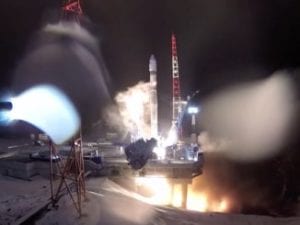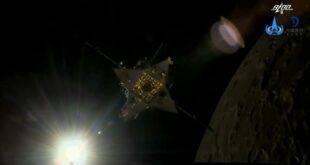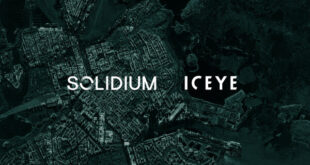
One of the more notable space stories of the past week is that of two Russian satellites allegedly ‘stalking’ a KH-11 reconnaissance satellite operated by the U.S. National Reconnaissance Office (NRO). Given heightened geopolitical tensions between great powers and the increasing occurrence of Rendezvous and Proximity Operations (RPO) in Earth orbit, SpaceWatch.Global will publish expert perspectives on this unfolding story over the coming days and weeks.
Our first perspective comes from Dr. Bleddyn Bowen, one of the leading experts on national security space in the United Kingdom.
1) How would you characterize the alleged manouvers of the Russian satellites?
This is pretty standard and unremarkable behaviour, and the United States leads the way in these kinds of proximity operations in the GEO belt. This is just another part of the cat-and-mouse spy games and technology testing that is occurring between China, America, and Russia. Russia could have a lot to gain by eavesdropping on the communications of those satellites, and getting a good visual look at the external hardware of sensitive US satellites. Russia has been able to manoeuvre satellites in GEO for some years. In 2015 the Olymp-Luch satellite conducted manoeuvres in GEO to match the sailing voyage of a Russian navy warship around the Indian and Atlantic Oceans to provide a communications relay. The close flybys of US satellites is new for Russia (so far as we know), but the US has been using close inspection and proximity operations satellites for some years already – most notably with the GEO Space Situational Awareness Program (GSSAP) satellites.
2) General John ‘Jay’ Raymond, Commander of the U.S. Space Force, has characterised the manuovers of the Russian satellites as “threatening” and “destabilizing.” Is this a fair characterization?
No, that is dramatization and hyperbole for news consumption. The United States shares a similar capability and history of proximity operations so it cannot fairly call foul on this behaviour. Though Russia may be doing closer proximity operations than we know the United States has, there is no agreed demarcation on what counts as threatening or inappropriate behaviour when ‘shadowing’ or ‘stalking’ satellites. The new US Space Force and its commander seems to be ignorant of USAF history and form on this issue. This kind of high-tech military behaviour by Russia, and American officials acting spooked and worried by Russia, is exactly the kind of symbolic, political, and highly public reaction that Russia wants – it enhances Russian military prestige and the international and domestic perceptions of Russia’s power and ability to keep up with American and Chinese military capabilities.
3) What can/should be done to mitigate/stop these kinds of incidences? How likely are we to see anything done at all?
Political will is needed on all sides to agree on a code of conduct. Since the EU-US International Code of Conduct has been killed off in the UN General Assembly, the US and EU and like-minded states would have to start again from scratch and codify some norms of behaviour between them. However the Code of Conduct did die partly due to its attempt to curtail military freedom of manoeuvre in space, rather than just trying to regulate civilian/commercial satellite orbital traffic. So long as Russia does not actively interfere with a target satellite or damage or destroy it, it can safely bet that the US will not respond aggressively. If, however, the Russians do damage or disrupt a satellite’s operation in GEO, I’d imagine the US response may be sterner, and may include new sanctions and restrictions on Russia. If anything goes wrong in GEO there’s a real risk to many states’ Critical National Infrastructures – so there’s a degree of existential deterrence in there. I’d bet that Russia would not intentionally try to disrupt activities or assets in GEO short of a condition of open warfare with their owners, so a real concern is of accidents happening during such proximity operations, and then a crisis escalating from that being mistaken for a deliberate attack on a sensitive piece of national infrastructure.

Dr. Bleddyn Bowen is a Lecturer in International Relations at the University of Leicester, specialises in space warfare and classical military philosophy, and teaches astropolitics, Cold War history, and modern warfare. He has published in several academic journals and provides advice and insight to practitioners on UK space policy, military doctrine, and European space policy, including to the UK House of Commons Exiting the EU Select Committee. Currently Bleddyn is completing his book manuscript provisionally entitled War in Space: Strategy, Spacepower, and Geopolitics, forthcoming with Edinburgh University Press, and convenes the informal research network The Astropolitics Collective.
 SpaceWatch.Global An independent perspective on space
SpaceWatch.Global An independent perspective on space




